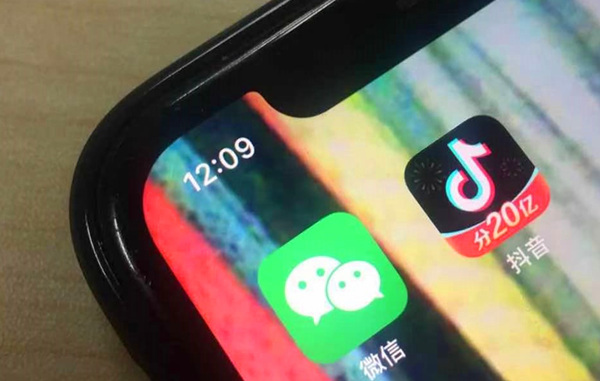Clash of internet titans: Douyin sues Tencent
- By Zhang Rui
 0 Comment(s)
0 Comment(s) Print
Print E-mail China.org.cn, February 3, 2021
E-mail China.org.cn, February 3, 2021
In a true clash of the titans, ByteDance's Chinese short video app Douyin sued Tencent Holdings for monopolistic behavior and asked for 90 million yuan ($13.93 million) in compensation, ByteDance said on Tuesday.

Douyin's complaint, filed at the Beijing Intellectual Property Court, stated that Tencent was restricting users from sharing Douyin content on its instant messaging apps WeChat and QQ, which amounted to monopolistic behavior. It asked the court to order Tencent to stop such behavior and demanded compensation.
According to the filing, since April 2018, Tencent had been restricting users from sharing Douyin content on its instant messaging apps on the grounds of "cleaning up short video."
Douyin said that Tencent was abusing its dominant market position to damage user rights, disrupting the normal operation of online products and services provided by third-party mobile app developers, and eliminating and restricting market competition.
"Tencent's monopolistic behavior hinders technological progress and innovation, and is not conducive to improving economic efficiency and social well-being, which can only help it distort market competition and consolidate its existing market position," Douyin stated.
Tencent responded in a statement saying it had not received the relevant filing materials and details of the complaints, but insisted that Tencent and its products always follow the principle of fair competition and open cooperation to provide services for users and third-party products.
"The allegations made by ByteDance are purely false and maliciously framed," Tencent said.
It countered that many of ByteDance's products, including Douyin, "illegally obtained personal information of WeChat users through various unfair competition methods and violated Tencent's platform rules. The court has ordered multiple prohibitions on it to stop such infringement immediately."
In March 2019, Tianjin Binhai New Area People's Court issued a ruling to stop ByteDance from providing user information taken from WeChat and QQ to another short video app under ByteDance.
Tencent said ByteDance and its affiliated companies still engaged in "many illegal activities" that infringed on Tencent's platform ecology and user rights. It also announced that it will also sue ByteDance.
After Tencent's statement, Douyin was quick to issue a refutation on Tuesday, claiming Tencent's claim that the allegations were "maliciously framed" was false, and it was not true to say it had illegally obtained personal information.
"Douyin believes that its users have absolute rights and complete control of their own information, and it takes precedence over the rights of any particular platform. Personal data is not the privately owned property of Tencent," the statement said.
"During three years of blocking Douyin content, impacting hundreds of millions of users, Tencent has released several short video products," Douyin pointed out, adding that WeChat and QQ, with more than 1.2 billion and 600 million monthly active users respectively, have penetrated into all areas of user life, which amounts to market dominance.
Douyin's lawsuit came as Chinese regulators step up regulations on tech giants. For years, China has been stepping up efforts to better regulate the internet industry, with the aim of ensuring equal participation in market competition for all types of market players.
The Draft Revision of the Anti-Monopoly Law, issued in early 2020, added provisions for determining the dominant market position of internet companies. The Guidelines on Anti-Monopoly in the Platform Economy, which was issued in November 2020 and has completed public consultation, encompasses a set of draft rules that could rein in the monopolistic conduct of the country's top internet firms.
Last December, China's State Administration for Market Regulation announced the launch of an antitrust investigation into the e-commerce giant Alibaba Group.
"At present, our country is continuously strengthening law enforcement against monopolistic practices and unfair competition. We hope that our lawsuit will help clarify how platforms should compete, and help improve anti-monopoly and anti-unfair competition rules," Douyin's statement said.
ByteDance is Tencent's largest social media rival. In August 2020, Douyin hit 600 million daily active users. Douyin's international version TikTok is also hugely popular. Tencent released Weishi, a short video app and also upgraded WeChat with a short-video feature.
The growing rift between the two titans can be traced back to 2018. The two have previously challenged each other on various issues from anti-competitive behavior to defamation.
In May 2018, ByteDance founder Zhang Yiming accused WeChat of banning Douyin and accused Weishi, Tencent's own short video app, of copycat updates. Pony Ma, president of Tencent Holdings, responded angrily that Zhang's words could be "understood as defamation."






Go to Forum >>0 Comment(s)